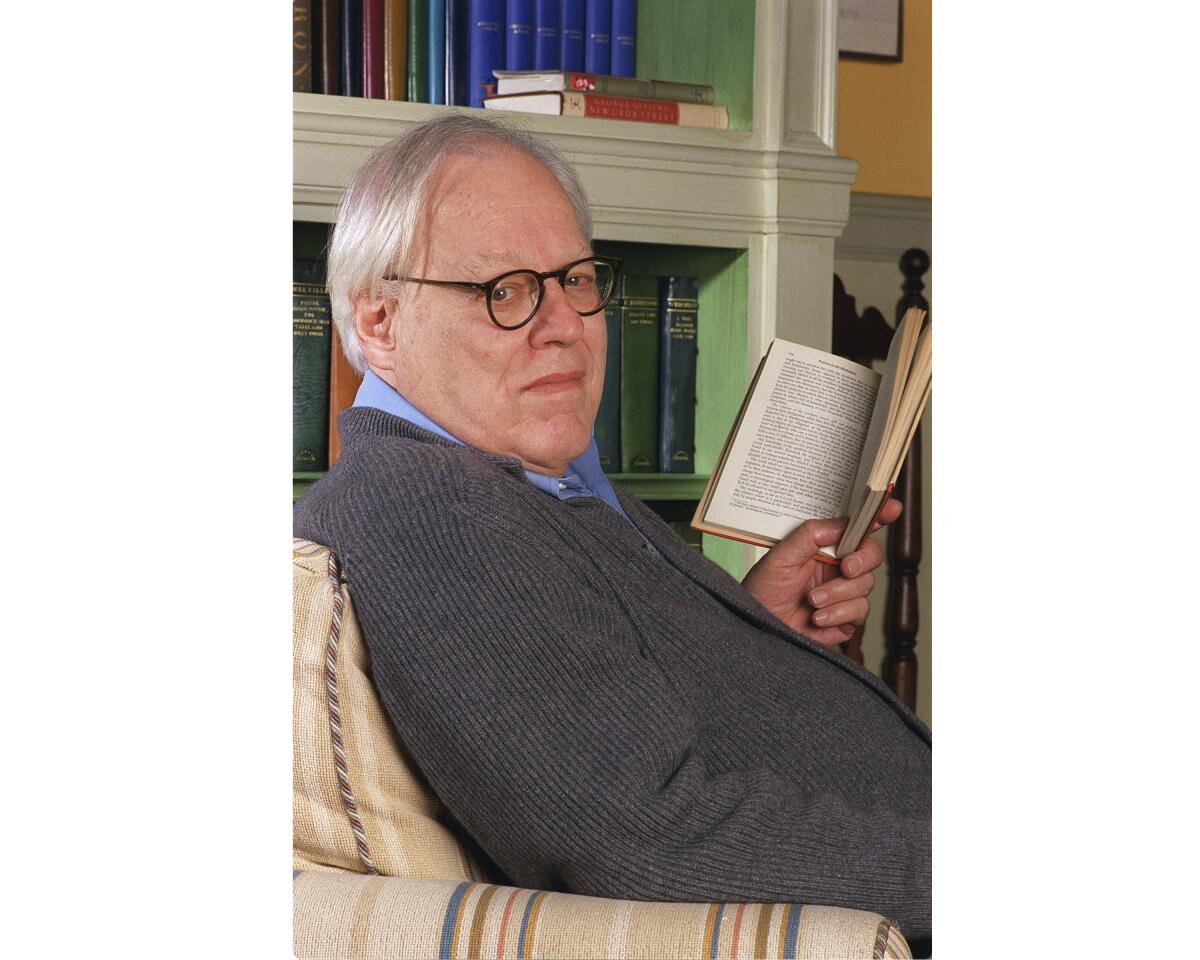Jason Epstein, publishing innovator who put the classics in paperback, dies

- Share via
Jason Epstein, a publishing innovator and bon vivant who helped put the classics in paperback, co-founded the New York Review of Books and worked with such novelists as E.L. Doctorow, Vladimir Nabokov and Philip Roth, has died at 93.
Epstein died Friday “surrounded by his books” at his home in Sag Harbor, N.Y., said his wife, Judith Miller, an author and former New York Times journalist. The cause was congestive heart failure, she said.
The book world has its share of accidental lifers and Epstein was one.
Once a young bohemian who desired only enough money to have time for reading, he took a job at Doubleday in the early 1950s, joined Random House in 1958 and remained for decades as editorial director. He became one of the industry’s most honored executives, receiving lifetime achievement awards from the National Book Foundation and the National Book Critics Circle.
Epstein was not just a man of letters, but of food and drink, whose own books included the memoir “Eating” and whose dining companions ranged from Buster Keaton to Jacqueline Kennedy to the notorious attorney-political operative Roy Cohn. In “Making It,” a 1967 best-seller about the literary world, Norman Podhoretz wrote affectionately of Epstein’s tastes for imported shoes, first-class travel and “appallingly expensive” restaurants.
“He was beautiful to watch,” Podhoretz observed.
Epstein was as well-read and as opinionated as the authors he worked with, “so damned intelligent,” author Norman Mailer would joke, once telling the Associated Press that he had to adjust to an editor “who might be a lot brighter” then he was.
Epstein published an early excerpt of Nabokov’s “Lolita” and fought unsuccessfully to convince Doubleday to publish the scandalous novel about a professor’s obsession with a 12-year-old girl. Epstein also feuded bitterly with Gore Vidal and became a critic of the Library of America, believing that the imprint he helped establish had grown bloated. Random House co-founder Bennett Cerf would call him the “cross I bear,” while Epstein labeled Cerf “the bear I cross.”
Vidal’s historical novel “Creation” is reissued
Among the many books edited by Epstein: Doctorow’s Depression-era novel “Billy Bathgate,” Jane Jacobs’ classic of urban studies “The Death and Life of Great American Cities” and Mailer’s CIA epic “Harlot’s Ghost.”
Epstein admittedly passed over the occasional best-seller, although he was proud of rejecting Shirley MacLaine’s New Age favorite “Out on a Limb.”
“We were friends and she actually wrote much of that book at my house in Sag Harbor. But she never told me what it was about,” Epstein said in 2000. “I read this and I said, ‘Come on, Shirley, you’re nuts.’”
The son of a successful textile salesman, Epstein grew up in Maine and Massachusetts, where he acquired his longtime passion for fine cuisine and spent so much time at the library that one librarian saved his card while he and his family spent a year in New York City. In the late 1940s, he entered Columbia University, when the school’s president was Dwight D. Eisenhower. Epstein met the future U.S. president once, and, by accident, made a fine impression.
“I had spent the night downtown with a girl,” Epstein said. “I could hardly stand up. I had been up all night and he thought I was a bright young fellow, up bright and early. He was beaming, and he shook my hand.”
In his early 20s, his quest for affordable classics inspired him to start one of publishing’s first literary paperback imprints, Anchor Books, now part of Penguin Random House.
He also helped launch two other major and lasting projects. One came in the early 1960s when a newspaper strike and the general tedium of literacy criticism led Epstein and his then-wife, Barbara, to help found the New York Review of Books, along with critic Elizabeth Hardwick and editor Robert Silvers, among others. In the late 1970s, he was among the creators of the Library of America, which offers hardcover editions of the country’s most influential writers.
He had two children with Barbara Epstein: daughter Helen Epstein, a contributor to the New York Review of Books, and son Jacob Epstein, a television writer whose time in the book world was brief and unfortunate. His novel “The Wild Oats” was published in 1979 and was soon found to contain numerous similarities to Martin Amis’ “The Rachel Papers.”
Jason Epstein was the rare publishing veteran to show early and unforced enthusiasm for technology. He looked for ways to sell books online before the rise of e-books and Amazon and was a strong advocate for in-store machines that could print and bind works on demand.
More to Read
Start your day right
Sign up for Essential California for the L.A. Times biggest news, features and recommendations in your inbox six days a week.
You may occasionally receive promotional content from the Los Angeles Times.







